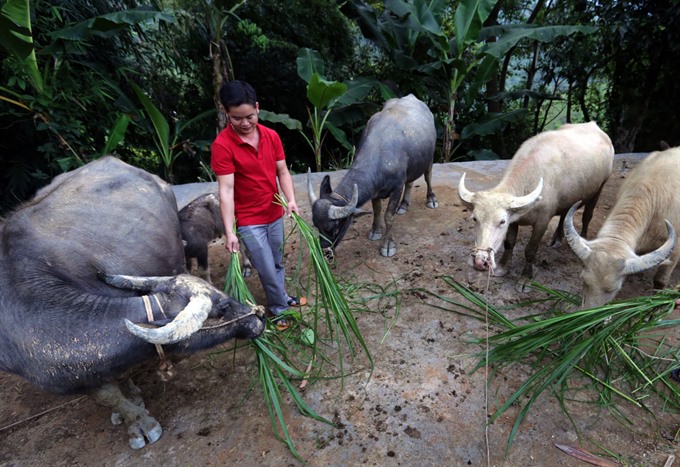 Society
Society

At least 10 per cent of investment capital in rural areas should be spent on improving clean water supplies.
 |
| A farmer in the northern mountainous province of Tuyên Quang. The National Target Programme on Sustainable Poverty Reduction has been funded with nearly US$950 million from the State Budget over the period from 2016 to 2018. — VNA/VNS Photo Trần Việt |
HÀ NỘI — At least 10 per cent of investment capital in rural areas should be spent on improving clean water supplies.
The idea was proposed yesterday at a working session between National Assembly Social Affairs Committee, Government’s Ethnic Minority Affairs Committee and ministries of planning, investment, agriculture and rural development.
They also suggested money obtained through Official Development Assistance (ODA), State budget and preferential loans should be prioritised for clean water and rural hygiene projects.
The proposal was made at a meeting held to review the implementation of a resolution to reduce poverty over the next two years.
The participants also proposed putting in place a special mechanism for programmes in rural areas, especially in disadvantaged region or areas located in the border and islands.
According to planning and investment deputy minister Nguyễn Văn Trung, nearly VNĐ22 trillion (US$957 million) has been mobilised from State budget for National Target Programme on Sustainable Poverty Reduction in the 2016-18 period.
Almost VNĐ2.7 trillion ($117.4 million) over the local state budget was spend in the past two years..
ODA agreements of poverty reduction signed between 2016 and August 2018 were estimated to be worth US$1.24 billion, accounting for nearly 12 per cent of total ODA investment during this period.
That money has been spent on developing small scale infrastructure, agricultural, forestry and fishery production combined with poverty alleviation, hunger eradication, small scale credit assistance and increasing competitiveness of animal breeding products.
According to Ministry of Agriculture and Rural Development, residents of poor districts have been given land and helped with cattle vaccinations.
Representatives of relevant sectors agreed that in the context of State budget limit, the programme needs a combined effort between locals and Government.
Local authorities must realise their commitment of mobilising reciprocal capital to implement national target programmes in general and National Target Programme on Sustainable Poverty Reduction in particular.
Favourable conditions should be created for commune-level authorities and community to conduct small-scale works with simple techniques to cut down on work construction spending from State budget, the officials said.
Deputy chairman of the Ethnic Minority Affairs Committee Phan Văn Hùng reported that the average number of poor households nationwide decreased to 6.7 per cent as of the end of 2017, a reduction of 1.53 per cent compared to that of the previous year.
The percentage of poor households in extremely disadvantaged, border communes or those in ethnic and mountainous regions decreased by 3 to 4 per cent last year.
However, the average income per person of ethnic groups and people living in mountainous areas reaches only VNĐ7-8 million each year, as much as one fifth of average income of the nation. Budget has not been poured to implement several poverty alleviation projects and policies approved by the Government.
National Target Programme on Sustainable Poverty Reduction for 2016-2020 issued in 2016 aims to cut the national poverty rate by 1-1.5 per cent each year based on multi-dimensional poverty criteria. In addition, efforts will be made to reduce the poverty rate among ethnic minority households by 3-4 per cent each year. — VNS




